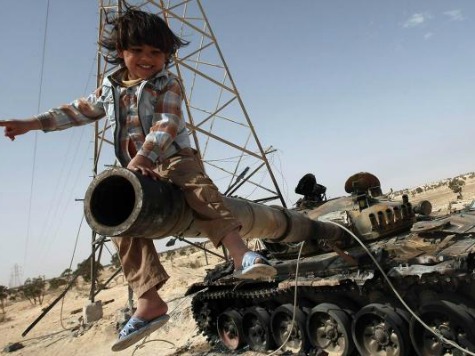The offensive by the jihadist terror group Islamic State of Iraq and al-Sham (ISIS) in Iraq has featured not only the murderous brutality expected in a war to impose fundamentalist Sharia law, but a shockingly rich library of Internet memes, propaganda posters, and on-the-ground journalism meant to persuade Muslims to join ISIS. One particularly alarming trend among self-proclaimed members and supporters of ISIS online is the repeated use of images of young children to promote the cause.
The diversity of such online endeavors is bewildering and has posed a significant problem for social media platforms like Facebook and Twitter, which have struggled to ban the most violent and harrowing images surfacing from the groups’ two warfronts in Iraq and Syria. There are many variations to ISIS’ online promotional material–from the celebratory photos of severed heads and burning cartons of cigarettes for being un-Islamic to Western-style memes using American coffins.
Possibly fearing termination of their Twitter accounts, many ISIS supporters have begun posting their propaganda using the term “Dawlah” for ISIS–the Arabic word for “state.” The “Dawlah” hashtag on Twitter reveals a number of disturbing images of young children wielding automatic weapons and participating in ISIS rallies, used in an attempt to sell the image that ISIS is popular with children.
Those uploading such images appear much more well-versed in Twitter than Facebook; not to mention Facebook has been significantly more successful at eradicating much of ISIS’s work from its website. Still, a cursory look at Facebook also uncovers the use of children in images meant to convey positive feelings towards Islamists globally:

In addition to being used for international propaganda campaigns, the Daily Mail reports that many of these children are made to fight and trained to kill. A recent video released by ISIS from Iraq shows children, appearing as young as eight years old, on the sidelines of a mass execution, forced to watch the adults do away with captured Iraqi soldiers.
While ISIS continues to devastate much of northern Iraq, reports on the ground show that many Sunni Muslims, even those of Kurdish ethnicity, fear the antidote as much as they fear the poison. “We are more afraid of Iran than of ISIS,” said one resident of Mosul to Spanish newspaper ABC, attempting to draw a line between ISIS, which kills indiscriminately, and “Sunni militias formed by tribes and Baathists,” comprised mostly of locals and not jihadists imported from the warfront in Syria, as many ISIS jihadists are.
As ISIS continues its march towards Baghdad, its aggression in promoting its cause is likely to grow, even from the extreme heights such brutality has reached in images posted online. Images of children used as props and trained as soldiers are a stark reminder that ISIS’ struggle against the West is not only a political one, and barely religious; it is a war of ideology and morality by a group determined to impose a morality in which such cardinal ethical transgressions are routine and proper.

COMMENTS
Please let us know if you're having issues with commenting.